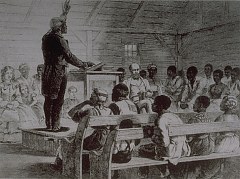By Nelly Clarkson
Thanksgiving Day has been a time-honoured tradition by many American families. Every year many American families, including African Americans, gather around dinner tables to feast and give thanks.
Thanksgiving Day Tradition
African Americans have long embraced the tradition of thanksgiving, even during slavery. In 1777 when the Continental Congress made a decree for the 13 colonies to give thanks for their victory over the British at Saratoga, the African slaves also took part in the celebration of giving thanks even though they had very little to be thankful for. Thus, the tradition was born and continued as a custom for celebrating rain and plenty of harvests.

engraving in The Illustrated London News,
5 Dec. 1863
For many black slaves, thanksgiving began as a church-oriented event. Black pastors could be heard through the small black churches’ sermons on struggles, hopes, fear, and triumphs. They usually grieved the institution of slavery and the battle of the black people and often hoped and prayed for a slave-free America.
The slaves also organized tiny feasts amongst themselves. The field slaves usually hunted
for wild game for their families and close slave friends. The women then made pone cakes or
cornmeal cakes to accompany the game. The house slaves usually had it better as they ate the
leftovers from their slave owners’ houses.
Other slaves usually took advantage of the lax work schedule and their travelling slave owners to escape from slavery while their owners were too far away to stop them. Since most slave families were usually separated since different slave owners owned them. Slaves usually requested passes to visit their families during Thanksgiving. Some then used these passes to explain why they were on the roads during their escapes.
Conclusion
Today many African Americans still spend this holiday visiting friends and families and enjoying a great feast. However, many have moved away from spending the day in church and rather spend the day with family and friends, being grateful for one’s blessings.


